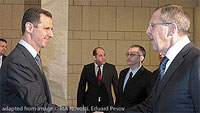NEWSLINK: Did Russia Just Throw Assad Under the Bus? Not really. Watch what the Kremlin does, not what it says

[Did Russia Just Throw Assad Under the Bus? Not really. Watch what the Kremlin does, not what it says – foreignpolicy.com – Andrew S. Weiss – Andrew S. Weiss, director of the RAND Center for Russia and Eurasia, served on the National Security Council staff, the State Department’s Policy Planning staff, and in the Office of the Secretary of Defense during the Clinton and Bush 41 administrations – Dec. 13, 2012 – http://www.foreignpolicy.com/articles/2012/12/13/did_russia_just_throw_assad_under_the_bus]
Writing in ForeignPolicy.com, Andrew S. Weiss addresses media reports that Russia might be weakening its support for Syria’s Bashar al-Assad:
… According to reported remarks of Deputy Foreign Minister Mikhail Bogdanov, Russia’s point-person for Middle East diplomacy, “As far as the victory of the opposition is concerned, it cannot be ruled out, and, to our regret, one should face the facts. The tendency is right in that direction, the regime and the authorities are increasingly losing control over an increasing territory.”
* * *
… His remarks at a hearing of the Public Chamber in Moscow suggest that, while the Russians are indeed likely to drop their support for Assad when the writing is finally on the wall, we probably aren’t at that point yet.
To understand Russia’s current thinking consider the following passages from Bogdanov’s appearance:
“They (the opposition) say they control 60 percent of Syrian territory, but we say: if you want to keep going, there is still 40 percent. If 60 percent [have been conquered] in two years of civil war, you will then need another year or a year and a half. If by now 40,000 people have died, the fight will get more fierce and you will lose dozens, or hundreds, or thousands of people. If you agree to that price for overthrowing a president, what can we do then? We, of course, think that this is absolutely unacceptable.”
“A campaign being waged by the West with support from the Arab League to distort Russia’s stance on Syria is aimed at weakening our influence in the region and at freezing Russia’s future relations with the Middle East and North Africa.”
Weiss holds that there are no signs Russia is willing to abandon Assad completely, and that Iran might actually be having a bigger impact on the ground:
… Amid a flurry of comments from the Syrian opposition and their foreign supporters that the Assad regime is finished, as yet there’s been no meaningful sign that the Russians are willing to withdraw valuable political, military, and economic support for Assad. (To be sure, Iran’s support for Assad is of far greater consequence for events on the ground.)
Indeed, the evidence runs in the opposite direction. Foreign Minister Sergei Lavrov on Sunday said, “We are not conducting any negotiations on the fate of Assad. … All attempts to portray things differently are unscrupulous, even for diplomats of those countries which are known to try to distort the facts in their favor.” …
In addition, Weiss suggests that Russia might actually be extrapolating from the Syrian situation to unrest closer to Moscow:
Moscow … fears that [Western humanitarian intervention] potentially sets a dangerous precedent for situations much closer to home, including on the territory of the former Soviet Union. While the Russians and Chinese were willing to give the NATO-Arab League coalition a pass on Libya (both abstained on the crucial U.N. resolution that authorized “all necessary measures” to protect civilians from Muammar al-Qaddafi’s murderous regime), they are trying to hold the line in Syria. To their ears, U.S. claims about supporting the democratic aspirations of the Syrian people and other parts of the Middle East are a mere smokescreen for America’s desire to promote regime change where and when it sees fit.
And then there is potential for Syria to serve as a base for Islamist activity in the Caucasus:
… The worsening security situation in the restive North Caucasus … helps focus their thinking. If Syria falls apart, the argument goes, it could easily become a hub for training and operations by Sunni extremists and even a potential source of loose WMD for like-minded jihadis …
Because of these and other factors, Weiss argues, “Whatever the reason, we should not be surprised if Moscow’s obstinance on Syria proves surprisingly durable.”
Click here for full article: http://www.foreignpolicy.com/articles/2012/12/13/did_russia_just_throw_assad_under_the_bus]
